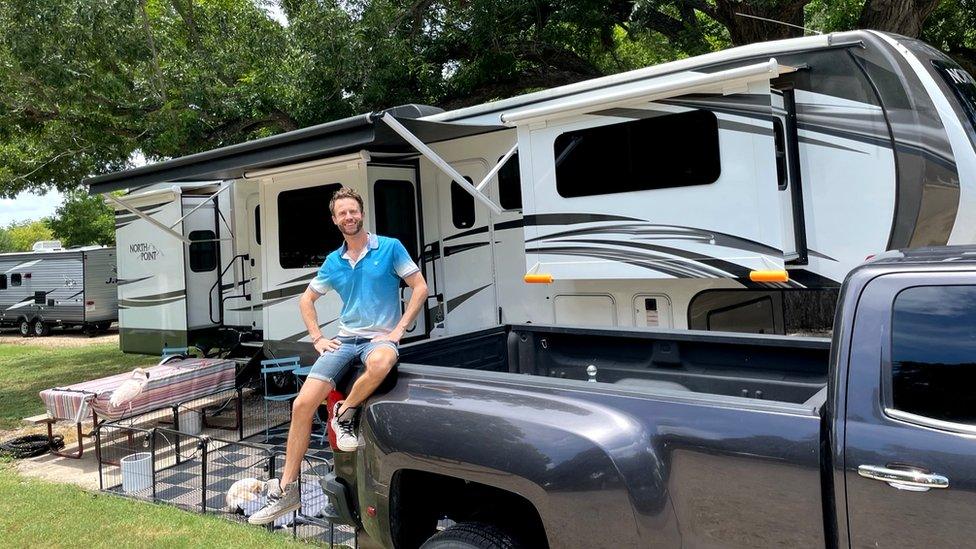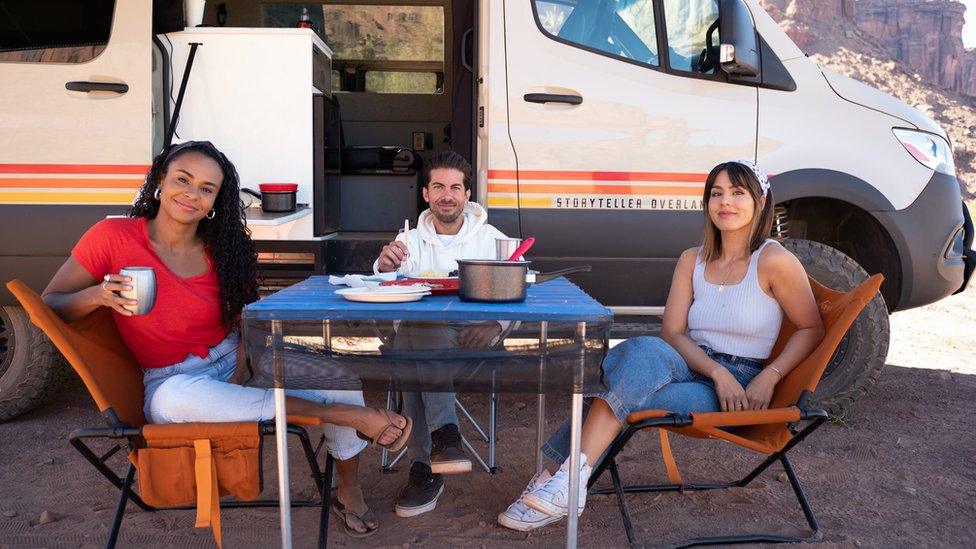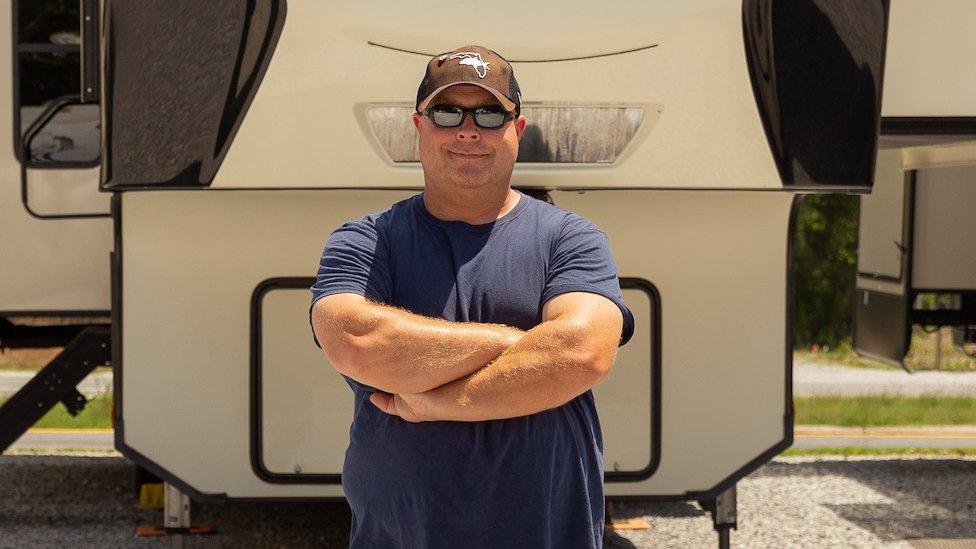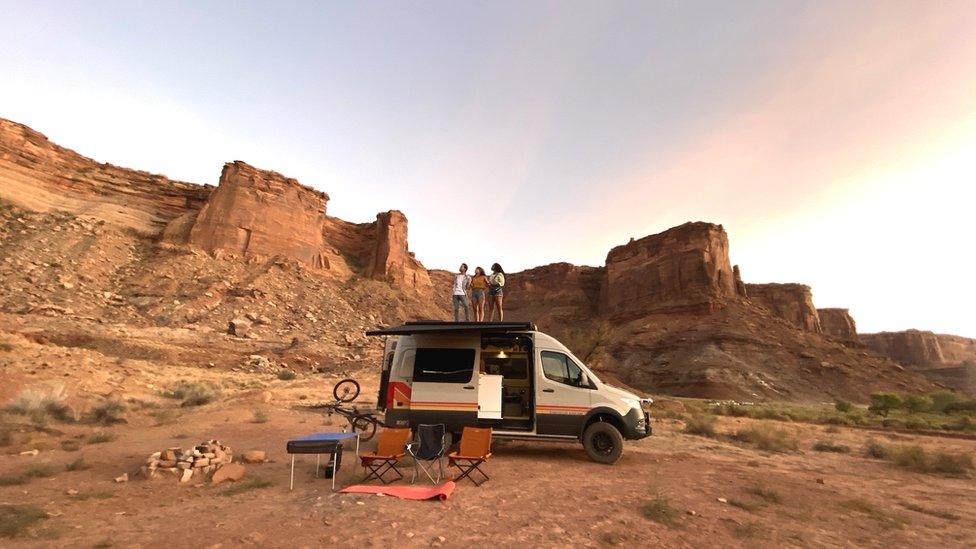Tired of working from home? Put the office on wheels
- Published

Nick Vivion runs his business from his mobile home
"I had always wanted to do this," says Nick Vivion of his decision to live and work full-time in a mobile home or recreational vehicle (RV). "I took some house money and bought myself a house on wheels, with no mortgage and no rent. Then never looked back."
Mr Vivion, the founder of US-based PR firm, Ghost Works, has spent the last four months as a digital nomad, living and working full-time in a mobile home.
He's not alone. Just in the United States, the RV Industry Association estimates there are approximately one million people living in them - from retirees to full-time wandering employees.
But for those who also need a decent internet connection, there can be a lot of frustration, particularly in a big country like the US.
"I read about all the different options and things to do and prepare, until my eyes bled," Mr Vivion recalls, speaking from his mobile home in Texas.
"But you are never fully prepared… it can get very stressful when you're constantly trying to get off a client call and want to wrap it up before they use all the data."
Mr Vivion says his first mobile WiFi hotspot often didn't function properly, forcing him to try additional options and eventually a commercial bus router of the sort used by intercity transport companies.
"I very quickly realised that redundancy is key," he adds.
Keeping people like Mr Vivion connected, working, entertained - and comfortable - is forming an increasingly prominent part of the global mobile home industry, which the firm Research And Markets estimates is worth approximately $42bn (£30bn).

Hosts of Netflix's The World's Most Amazing Vacation Rentals, from left to right, Jo Franco, Luis Ortiz and Megan Batoon
"The truth is that first time travellers, and even seasoned travellers, might hesitate staying in an RV in fear of having to ditch their comforts," says Joanna Franco, the host of Netflix's The World's Most Amazing Vacation Rentals.
"But the experience is getting close to staying in a standard home - with way better perks," Ms Franco adds. "RV technology is getting more user-friendly."
Among the companies offering solutions for digital nomads is the Indiana-based Aluminum Trailer Company (ATC), which offers a range of caravans (or trailers in the US).
ATC chief executive Robert Paden says demand for mobile connectivity has spiked as a new generation of nomads takes to the road.
"We've seen an especially large increase in people new to the camping and off-grid world coming out of the Covid-19 pandemic.
"Many of those still want to stay connected for remote work or family purposes, so we've seen increased demand for features that allow for reliable connectivity."
His company offers solar panels and mobile phone signal boosters.
"It's somewhat ironic, because the idea is you can be totally unplugged…. but still catch up on your Netflix shows," says Mr Paden.

Brian Demo, retired US Marine Corps helicopter mechanic - now a master RV technician
"We certainly have a lot of customers who don't want to have anything to do with technology in their RVs, but the majority are wanting to have access to the same entertainment they do at home."
Mr Paden adds that for a new generation of consumers, road trips are no longer merely about getting away and unplugging from the digital world.
"It's about lengthening stays and extending experiences, including bringing along technology you would normally have at home," he says.
Brian Demo is a retired US Marine Corps helicopter mechanic and now a master RV technician and expert at JustAnswer - a website which connects subject matter experts to people with questions. He has noticed mobile homes becoming more and more sophisticated.
"The computer systems that are in some of these coaches are mini-tablets that you can [use] to operate the entire RV," he explains.


As an example, Mr Demo points to In-Command, a company that produces control systems that allow users to control a variety of features remotely from anywhere in the world.
"You can run that from your cell phone to run the electrical system in your coach, operate your levelling jacks and even adjust temperature for your air conditioning, or furnace," he says.
Mr Demo says that the pandemic has cemented the high levels of demand for connectivity technologies.
"More people had to rely on faster internet speeds to get work done remotely, so there was more leaning on the cell phone side with hot spots, especially with families that had children in home school.
"Trying to put everyone on bandwidth-sucking video conferences put a serious strain on home networks."

Getting a mobile phone signal in some places can be tricky
Kevin Taylor, the founder of Powerful Signal, says WiFi at mobile home parks can often be patchy - so his firm specialises in mobile phone signal amplification devices.
Each amplification system includes an aerial outside the mobile home that works to capture signals outdoors from local towers.
"That signal is then transmitted by cable to an amplifier inside," he explains. "The amplifier boosts the signal power and sends it to [another] antenna inside the RV, which rebroadcasts the signal to the cellular devices inside the vehicle."
According to Mr Taylor, these antennas are constantly improving, making it likely that in the near-future travellers will be better connected than ever before.
"We swapped out an antenna for a customer on a system the other day, and his data speeds doubled," Mr Taylor says. "This is important with all the big bandwidth applications now in use."
"Most of the innovations we expect to see are in new apps for cellular devices that can be used anywhere, and will generate more demand for signal boosters in RVs," he adds.
Nick Vivion, for his part, says he believes these technologies will become increasingly commonplace as more and more professionals hit the highways, eager to avoid high housing prices and made familiar with remote work by the pandemic.
"I'm meeting pilots, nurses, insurance agents - all kinds of folks," he says. "It's become really appealing. It's not even out of necessity. It's like I'm able to get the perfect condo. It just happens to be on wheels."